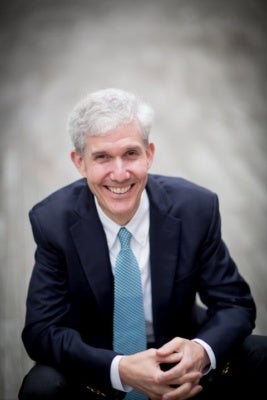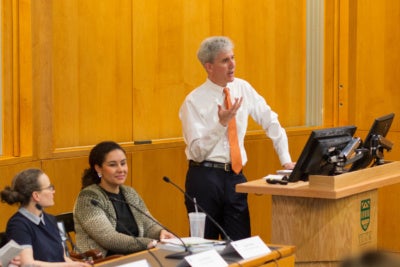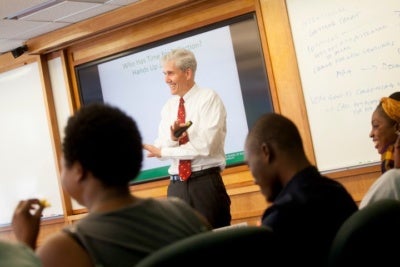You might be mistaken for thinking we were more than two months into the 2020s, thanks to non-stop geopolitical news from military action in the Middle East to a pandemic in East Asia (to say nothing of headlines from Washington). What can prepare business executives to lead under such circumstances? That question motivated Matthew Slaughter, Dean of Dartmouth’s Tuck School of Business, to create Leadership in the Global Economy, a course recently recognized with an Aspen Institute Ideas Worth Teaching Award. We spoke with Dean Slaughter about the course’s unique “mock congressional testimony” pedagogy, teaching in the 2020s, and more.
Your course focuses on the dialogue between business and governments around the globe. What led to the development of this course and what gap in knowledge and skills does it address?
At the Tuck School, we have a very clear definition of leadership. Leaders have the ability to craft a compelling vision for the future – including whether, why, when, and how to change – and to guide execution of that vision with and through other people. Over the years, I have had the good fortune to work both in public service and with a number of companies, and I have always been struck at how challenging it can be for leaders in business to articulate a vision for the future that is compelling not just to stakeholders of their organization but also to broader stakeholders in government and in civil society.
This challenge can be most acute in Congressional hearings (or similar governmental hearings in other countries). I have testified before Congress many times, and at these hearings I have been witness to some of the most riveting leadership successes and struggles – such as at this hearing in November 2008 when, in the depths of the World Financial Crisis, the Big Three CEOs were arguing for tens of billions of dollars in emergency taxpayer support. At this hearing, I was the one witness who argued that rather than provide taxpayer support to these companies, we should instead use those taxpayer resources to forge new ways of supporting struggling workers and their communities – to use the crisis as “an impetus for meaningfully expanding the economy-wide social contract … to better distribute the gains of our dynamic economy.” That fascinating hearing, in particular, sparked the idea of creating a course that would allow Tuck MBA students the opportunity to experience that sort of leadership challenge of articulating sufficiently compelling visions for change.
Thus does LGE blend the two broad learning goals of (1) examining contemporary global business issues, building off of tools and frameworks first experienced in our first-year core curriculum, with (2) expanding students’ ability to articulate and defend compelling visions for change.

The US-China trade war, and the tribulations of globalization, feature heavily in your Fall 2019 syllabus. There is no shortage of headlines at the intersection of business and politics – how would you adapt your approach to current events the next time your course is offered?
Each time I offer LGE, student feedback and interests are an essential input for deciding on the particular topics we will address in the hearings – gleaned from course evaluations, student lunches, in-the-hall conversations, and even suggestions I hear from alumni I have the pleasure of seeing in my role as dean of the Tuck School. Another important input over the years has been what topics I see business leaders grappling with – from my own work with individual companies and industry associations, and again from the experiences of our alumni. So, for example, for a few years after the depths of the World Financial Crisis a staple LGE topic was compensation for finance executives. But over time its salience faded, and into the mix came global warming and climate change. Because our world indeed has no shortage of headlines, I try to finalize the syllabus as close in as possible. So for next fall, I imagine that whether the U.S.-China trade war remains a topic will depend on what comes after the recently signed Phase One Agreement.
Let me add that because LGE aspires to engage students with the issues of the day, each day’s “Around the World” discussion is driven entirely by what topics students identify in the course wiki. Many ATW topics have points of contact with my pre-selected topics, but often they do not. Last fall the course ended up addressing in real time topics as diverse as the Boeing 737-Max crisis – in particular, Dennis Muilenberg’s Congressional testimony – and the “OK, Boomer” meme.
Your syllabus starts with emphasis on the long aftershocks of the last financial crisis. How do you think teaching the ever-shifting lines between business and politics will evolve in business education in the 2020s?
The 2010s started from a frame of reference of deep damage from the World Financial Crisis, where there was still much confusion and uncertainty about what had happened and who might be responsible. The 2020s start from a fundamentally different point economically. On many measures, the U.S. labor market today is the strongest since I have been alive. But inequality – of income, wealth, and opportunity – has grown much more problematic over the past decade. So, too, has the consensus around and concern about global warming and climate change grown. These two structural features look set to dominate much of the interplay between business and public policy in the years ahead. More generally, the fusion of digital, global and social forces are today much stronger than they were a decade ago.
As I regularly say to students in LGE, all of these complexities are a massive leadership opportunity for each of them. They have the opportunity to apply their MBA talents to these complex issues. I am impressed that 181 CEOs of the Business Roundtable recently signed a new “Statement of Purpose” that identifies five key stakeholders – shareholders, employees, customers, suppliers, and local communities – their businesses aspire to support. Our MBA students of today are the managers and leaders of these purposeful organizations of tomorrow who will have the opportunity to meaningfully deliver on these multi-stakeholder goals. What an exciting time for our students and alumni, because the world is keen for wise, decisive leaders who can better the world through business.

As alumni from your course go into leadership positions across industries and sectors, what is the one lesson that you hope will stick with them throughout their careers?
The main lesson I want students to take from LGE – and from all of Tuck – is that they don’t need to know all the answers. Rather, what is often most important is knowing what questions to ask, not what answers to give. Great leaders are great teachers, and great teachers are great lifelong learners. Time and again, the one talent that boards of directors seem to seek more than any other in a new CEO is her or his capacity to learn. No successful CEO or any other such leader ever knows all the answers.
The most compelling visions for change take time and care to craft, starting with asking questions that acknowledge that no matter how strong and successful today might be, there is a tomorrow that could be even better. I want our students to always maintain that decisive balance of confident humility about themselves: confidence about what they know and have mastered, humility about what gaps they recognize, and decisiveness to seek to close those gaps in trusting teams.
![]()
Interested in more innovative insights for business education? Browse our complete collection of interviews with outstanding educators, and subscribe to our weekly Ideas Worth Teaching digest!

